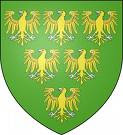OK, so
they may not be the most reliable source, get dates wrong, confuse people and
be heavily biased, but they are one of our primary sources and their
content has been used to either damn or praise people and most often, these
comments stick. These are my favourite Piers Gaveston quotes from
assorted chronicles. Read and enjoy!
1.
From the St Paul’s Annalist, describing Piers at the coronation of Edward
II. Piers was dressed in royal purple, and "so decked out that he
more resembled the god Mars than an ordinary mortal". My favourite
quote ever! More than likely Piers’ favourite as well!
2.
A classic from the Vita Edward Secundi - "I
do not remember to have heard that one man so loved another. Jonathan cherished
David, Achilles loved Patroclus. But we do not read that they were immoderate.
Our King, however, was incapable of moderate favour, and on account of Piers
was said to forget himself, and so Piers was accounted a
sorcerer." Roughly translated as ‘wow! They really love
each other, just like others in the past. Bit over the top most of
the time. The King needs to rein it in a bit!’. No doubt the
sorcerer reference led to stories later on that Piers’ mother had been a witch.
3.
From the Vita again. Piers "alone found
favour in the king's eyes and lorded it over them [the English barons] like a
second king, to whom all were subject and none equal. Almost all the land hated
him..his name was reviled far and wide...he was an object of mockery to almost
everyone in the kingdom." No-one of course could out-mock Piers, and
being like a second king obviously made any insults bearable. Being
adored and raised high by Edward, Piers no doubt thought it was worth it;)
4.
Of course, his arrogance grew – and the Vita gives us this great
description. I can just imagine Piers "scornfully
rolling his upraised eyes in pride and in abuse, he looked down upon all with
pompous and supercilious countenance…indeed the superciliousness which he
affected would have been unbearable enough in a king’s son."
5.
From the Canterbury Chronicle we
learn Piers came from ‘the region of fine manners he was
courteous’. Gascony must be THE place to get your manners from;)
6.
Another chronicler, Geofffrey Le Baker, writing years later,
recalls why Edward Ist had thought Piers was an ideal companion for his
son. Piers was ‘graceful and agile in body,
sharp witted, refined in manners, sufficiently well versed in military
matters’ He sounds an ideal role model, doesn’t he? Note the ‘well
versed in military matters’ – yes, he really was an excellent soldier, not a
languid fop!
7.
Another reference to Piers as a king – “two kings reigning in one kingdom, the one in name and
the other in deed". How pleasing that Edward had someone
willing to help him reign. And I’m sure he let Piers wear his crown as
well, as it probably looked sooo much better on him;) After all, digging
ditches and thatching roofs is quite tricky wearing royal robes and jewels.
8.
An absolute classic from the Trokelowe Chronicler. The alleged scene when Edward
returned from France with his bride and greets Piers after his absence.
Edward was ‘giving him kisses and repeated embraces, he was adored with
singular familiarity’. The line that launched a thousand scenes in
‘historical’ trashy novels, with a helpless Isabella looking on. Sort of
like a medieval ‘From here to Eternity’ scene, with Edward and Piers crashing
through the surf for a huge snog! Yeah, right! Personally,
I’d like Isabella to have said to her maids ‘gosh, Ed’s friend is rather hot,
isn’t he? ‘ Of course, what was missed out in these novels is that Trokelowe
adds ‘ Which special familiarity, already known to the magnates, furnished fuel
to their jealousy’. So Isabella wasn’t offended at all, just the other
nobles who wanted to be embraced firstJ
9.
Yet again, from the Canterbury Chronicle, ‘He adopted such a proud manner of bearing towards them,
that the earls coming before him were forced to kneel in order to bring their
reasons before him, ‘ I do hope the Chronicler means Thomas of Lancaster
and Guy of WarwickJ
10.
And talking of Thomas of Lancaster, the Lanercost
Chronicler mentions this scene – a meeting between Edward and Lancaster to
reconcile, with Piers present. Lancaster "would
neither kiss him [Piers], nor even salute him, whereat Piers was offended
beyond measure." Oh Piers, you surely don’t want a kiss from
Lancaster? Really? Actually, it was highly unlikely Piers was there
anyway – so hence he didn’t get a kiss from Lancaster.
Sources - Seymour Phillips 'Edward II' , J.S.
Hamilton Piers Gaveston, Earl of Cornwall, 1307-12: Politics and
Patronage in the Reign of Edward II Kathryn Warner
Edward II
Part 2 to follow........














